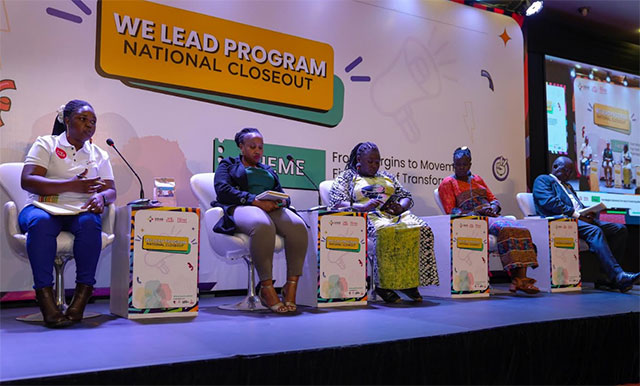
Kampala, Uganda | THE INDEPENDENT | The SRHR Alliance Uganda has announced the end of the WE LEAD programme, a five-year initiative that focused on strengthening the position of sexual reproductive health and rights (SRHR) of young women.
The announcement of the end of the programme was marked with the National Close Out event on 16th July 2025, at the Serena hotel, Kampala, under the theme: “From margins to movement: Five years of transforming SRHR realities”
The close-out event aimed to bring together key stakeholders to celebrate achievements, reflect on lessons learned, promote the sustainability of outcomes, and cement the programme’s national legacy in advancing the leadership, rights, and health of marginalised young women and girls in all their diversity.
The event was attended by various project beneficiaries, including Community of Action Organisations (CoAs), Host organization, Rights Holders, Consortium partners (Restless Development, FEMNET, Positive Vibes), donor representatives (HIVOS), Government officials (District-level), National Youth Council, representatives from the Dutch Embassy in Uganda, Members of Parliament and Cultural leaders.
The WE LEAD programme started in 2021-2025, and aimed to strengthen the influence and position of young women whose SRHR are mostly neglected.
The programme sought to give a voice, strengthen the agency and build a strong movement of resilient young women who can claim their SRHR to be recognised and respected by society.
The initiative targeted 4 rightsholder groups: young women and adolescent girls who live with HIV, those with disabilities, young key populations, and those affected by displacement.
WE LEAD was funded by the Dutch Ministry of Foreign Affairs under the SRHR Partnership Fund, which is part of the Strengthening Civil Society subsidy framework and is implemented by consortium partners including Positive Vibes, Restless Development and FEMNET in Africa, and Hivos as the lead partner.
In Uganda, the programme was implemented in 8 districts. They included Terego, Arua, Gulu, Amuru, Jinja, Kamuli, Busia and Tororo.

WE LEAD was hosted by the SRHR Alliance Uganda, whose role was to coordinate and provide leadership to 16 Communities of Action organisations, including HRAPF, FEM Alliance, RWHU, WERO, TAI, UKPC, AWAC, NAFOPHANU, UNYPA, UGANET, ASHWA, RHU, NGF, Birungi Charities, IDIWA and Tunawezza foundation.
Delivering the keynote address, the Deputy Mayor, Jinja, and the chief guest expressed appreciation for the project and its success and called for concerted efforts to continue the initiative even without funding.
“We should not bury the fruits of this project,” she emphasised. “You have built the confidence of beneficiaries who once had low self-esteem. What we now need is a multiplier effect of this project, with or without additional funding.”
She went on to challenge government agencies, such as the National Youth Council, to draw lessons from this initiative and replicate it, noting that they are directly responsible for addressing these issues as well as having youth-friendly spaces in hospitals.
WE LEAD achievements
SRHR Alliance Executive Director, Olgah Daphynne Namukuza, highlighted some of the achievements registered:
“While we also engaged boys and men in some areas, our central focus was on empowering young women and girls to realise their sexual and reproductive health and rights. We aimed to ensure that, as they grow, they understand their rights, particularly the right to access health services without discrimination. Through capacity strengthening and human rights education, we’ve supported their growth and confidence,” said Namukuza.
Beyond health, SRHR also addressed economic empowerment, making sure these young women have the tools to live independently and confidently.
SRHR worked to ensure that Uganda’s health systems — especially in those districts — are youth-friendly and inclusive, so that these young women can access sexual and reproductive health services without fear of judgment, stigma, or discrimination.
“Importantly, we’ve empowered them to speak for themselves. They have taken the lead in engaging with duty bearers, policymakers, and community leaders. And we’ve seen progress. For instance, local leaders in some districts, like Kamuli, have enacted bylaws to ensure people with disabilities can access services. Others have passed ordinances to address child marriage and early pregnancy, ensuring perpetrators are held accountable.”
“Of course, we acknowledge that challenges remain — and we don’t claim to have solved everything. But to a great extent, I am confident that we have delivered on our mandate and created a foundation that can be built upon going forward.”
Beneficiary experience
Jimbo Shanurah, the Youth Chairperson of the National AGYW forum, said: “There were times when the shame and stigma spoke louder than my voice. But now we find ourselves in spaces that are inclusive and affirming. Our experiences are heard. Our ideas are valued. Our rights are upheld. And our potential has been unlocked.”
 The Independent Uganda: You get the Truth we Pay the Price
The Independent Uganda: You get the Truth we Pay the Price



